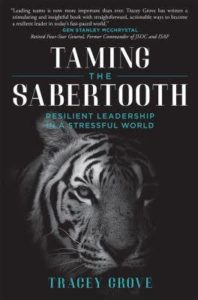One-third of employees report feeling levels of stress that are unsustainable. Forty-two percent of people have left a job simply because it was too stressful. The effects of stress lead to trillions of dollars in lost productivity every year.
These are just some of the distressing stats author and leadership coach Tracey Grove shared with Gravity employees when she visited our Seattle office in early May. Tracey specializes in helping employees and teams respond to stress so they can focus on what’s important and accomplish their goals.

Author and Coach Tracey Grove
Many of the strategies Tracey shared are detailed in her book Taming the Sabertooth: Resilient Leadership in a Stressful World. The title was inspired by the origins of our stress response. Early humans needed a way to quickly detect and respond to threats. Our stress response–commonly known as “fight or flight”–does just that. When danger is present, our amygdalas (the part of the brain that controls emotions) sends a signal to the sympathetic nervous system, which releases hormones like cortisol and adrenaline. As these hormones flow through our veins, we become equipped to act quickly to either flee or fight off the threat. Once the threat has passed, our bodies recover and we can return to functioning in a more rational way.
Unfortunately, while we no longer have to worry about being eaten by saber-tooth tigers, our stress response has not adapted to the new types of stress we experience today. Today’s stressors–endless emails, social media, 24/7 information steams–may not seem as threatening as a hungry predator, but they are always present. When our brains are constantly beaming warning signals, our bodies respond as they always have–flooding our bloodstream with stress hormones. But because we never fully escape our stressors, those hormones remain in our bodies, eventually fatiguing them and leading to burnout.
Get the Gravity newsletter for the latest FAQs, tools, tips and tricks
Stress, Tracey says, is a fact of life. We cannot eliminate it entirely, and, paradoxically, we need a certain amount of stress in order to stay motivated and productive. So if we can’t avoid stress altogether, the best thing we can do is to become more resilient in responding to it. “Resilience is not the ability to avoid difficulty,” she said. “It’s not about avoiding crises or challenging situations. It’s about withstanding and adapting to it.”
Tracey says we build resilience by practicing three C’s: challenge, control, and commit. Our brains are constantly processing information and, over time, we form narratives in our head that may or may not be accurate. We make assumptions about ourselves and others that often inform how we behave. In order to be effective, we must challenge those assumptions by focusing on facts instead of fictions.

In a distracted world, it’s easy to feel a lack of control over our lives. Our attention is constantly being pulled in different directions, often by things or people that are not that important. By focusing on the things that are in our control, we can create balance and boundaries in our lives that help eliminate–or at least limit–unnecessary distractions.
Finally, we must commit to our own self care. What helps us feel better about coming to work or going home at the end of the day? What can we do to help ourselves recover from everyday stress? Making these things part of our routine rather than treating them as luxuries or indulgences will help our bodies recover from the stress caused by so many external stimuli. Tracey emphasized the importance of sleep and urged us to “sleep like a caveman” by clearing clutter, “embracing the dark,” staying cool, and sticking to a schedule. “Sleep is probably the most important thing you can do for your well being,” she said.
Citing a variety of scientific research, Tracey offered a number of tips that can help you build resilience and live productively in a stressful world. One way is to achieve “flow.” Also known as being “in the zone,” flow is a mental state in which you are deeply and intensely focused on the task at hand. When you achieve flow, the rest of the world seems to fall away and all of your mental energy is being directed toward one place. During flow, we are energized but calm and therefore better able to focus on complicated work for an extended period of time. If you’ve ever experienced flow, you know how great it feels–and how productive it allows you to be. The trick is figuring out how to reach this optimal state whenever you need to accomplish a big task.
Tracey offered a few suggestions. First, know your natural energy peaks throughout the day. If you’re more energetic in the morning, do your most difficult and important work first thing. If you’re a night owl, reserve some time in the evenings where you can focus on what you want to get done. Set aside less-important or easier tasks for the times when your energy is low. Do you experience a post-lunch slump? Are you completely tapped out by 4pm? Use this time for things like checking email, doing busy work, organizing your desk, or anything else that doesn’t require a lot of cognitive energy.
You also want to limit distractions during periods of flow. Turn off email or text notifications. Silence your phone. If you work in an office, close your door or move to a different location where it’s less likely you’ll be interrupted. This can be difficult at first because you fear missing out on messages or information. That’s why Tracey urges you to resist the fear of missing out and instead “enjoy the joy of missing out” because you know you’re spending your time on something truly worthwhile.
Finally, break big tasks down into smaller ones. If we think of all the work that needs to be done to reach a certain goal or complete a certain project, we’re likely to feel overwhelmed. Breaking things down into smaller chunks that can be finished within a few hours helps you reduce stress while allowing you to check something meaty off your to-do list.
Another way to build resilience is to be optimistic. We tend to think of our moods as something we can’t really control since emotions are so often triggered by events and situations. But Tracey says that, when we practice certain habits, we can train ourselves to become happier and more hopeful even when times are challenging. “Optimism is a choice,” she said. “I know that we often say that people are optimists or pessimists or some people see the glass as half empty or half full. It doesn’t matter. You can choose this, and you can learn this.”
One of the best ways to become more optimistic is by practicing gratitude. Tracey explained that our brains are programmed to focus on the negative so we can protect ourselves from threats and plan for the future. But when we force ourselves to focus on the positive, we’ll train our brains to see the world differently. “Gratitude does huge psychological good,” she said. “It can actually counteract depression, anger, frustration, envy, and even regret, but you have to practice it consistently.”
You can practice gratitude in a number of ways, but Tracey recommends keeping a daily journal of all the things you’re grateful for. Each night before bed, take fifteen minutes to jot down the great things that happened to you that day. These don’t need to be momentous or life-changing events; they can be as simple as enjoying a good meal with a friend, spending time in nature, or engaging in one of your favorite activities.
Another way to encourage optimism is by being kind to others. Not only do acts of kindness make us feel good in the moment, but they help us form positive relationships with other people that enrich our lives. Again, Tracey says, these don’t need to be grand gestures; just moments that demonstrate to someone else that you care.
Tracey also cited recent research that has shown how experiencing wonder can reduce stress by allowing us to live in the moment. Wonder, she explained, does three things: expand our sense of time so we feel more present; bonds us to others, and reduces stress. Finding moments of wonder in our daily life–whether it’s listening to a great song, spending time with a loved one, or watching a beautiful sunset–will allow you to stay centered and disconnect from the chatter that so often distracts us from enjoying life to its fullest.
Ultimately building resilience is about having empathy for others and yourself and remembering that becoming more resilient is a practice. “Resilience is a practice. Don’t put yourselves under pressure. Don’t feel like you have to be perfect at it,” Tracey reassured us. “For everybody the journey will be different. Find your own sweet spot. Find what works for you. Find what makes you feel better and helps you nurture your recovery…But really it’s important to be kind to yourself. You’re going to have days when you fall off the wagon…but, remember, we’re all in this together.”
For more on Tracey, visit her website https://www.puresymmetry.com
By Brooke Carey, Lead Storyteller
The Gravity Speakers Series brings experts from a wide range of fields–from business to politics to arts and entertainment–to our office to share their insight and knowledge with our team.



